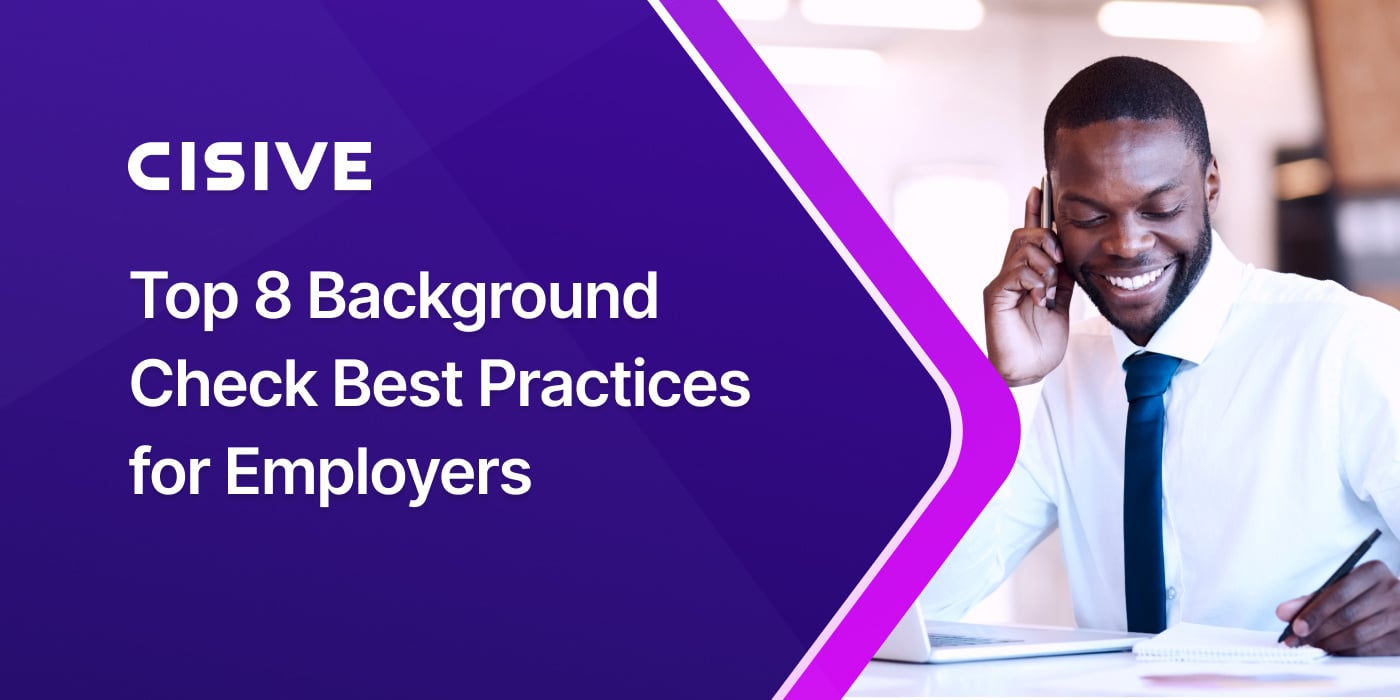

What happens when a candidate fails a background check after you’ve already extended the job offer?

Whether you're a hiring manager or an HR professional, you need honest, reliable employees to help your organization achieve its goals. However, the background check process is rife with potential pitfalls, such as privacy violations and a lack of legal compliance.
The good news is that following a logical set of background check best practices can help you stay in compliance and avoid common bottlenecks.
Key TakeawaysHere’s what you need to know about background check best practices:
|
Following a consistent set of best practices helps recruiters and other HR professionals save time and increase productivity.
Think about what would happen if you followed a different process every time you completed a background check. You’d probably waste time on unnecessary tasks or have trouble determining when to move from one background check to another.
Background check best practices also ensure that everyone in your organization is on the same page when it comes to candidate and employee screening. If every person did things their own way, you’d have no way of knowing if every candidate underwent a thorough screening.
One person may be too lenient, while another one may be too strict, so following best practices also helps increase the overall quality of your workforce.

Pre-employment background checks must comply with the Fair Credit Reporting Act (FCRA) and the guidelines set by the Equal Employment Opportunity Commission, so it's important to understand your obligations.
The FCRA regulates the collection, distribution, and use of consumer credit reports. Under the FCRA, you must obtain a candidate's consent before completing a background check as part of the hiring process.
If a candidate's background check reveals concerning information, you must issue a pre-adverse action notice. This notice contains a copy of the background report and a summary of the candidate's rights.
Should you decide not to hire a candidate based on information in their credit report, you must also issue a final adverse action notice.
Under EEOC guidelines, it's illegal to discriminate against someone based on the following:
These guidelines apply to all aspects of employment, including the hiring process. Therefore, you should avoid using background checks to gather information that isn't related to a candidate's job qualifications.
To avoid compliance issues and make sure all candidates and employees receive fair treatment, develop a clear, written policy outlining when and how you conduct all background checks.
For example, if you conduct one background check during the hiring process and one background check per year for as long as an individual remains employed with your organization, outline this procedure in your policy manual.
It's also important to list the types of background checks you plan to complete. Many candidates are aware of criminal background checks, but they may not be familiar with other screening methods.
Your background check policy should include the following elements:
Establishing a clear policy promotes fairness and transparency in the hiring process.
Recommended Reading: 10 Best Background Check Companies in 2024
Using multiple vendors introduces additional complexity into the background check process. To streamline your efforts, select a reputable background check provider capable of meeting your organization's unique needs.
Thanks to advances in technology, it's possible to automate many aspects of background screening, such as obtaining candidate consent and ensuring compliance with relevant laws and regulations.
If you want to increase efficiency and reduce the risk of errors, partner with a background check company that incorporates these technological advances into its offerings. It's also important to find a background checking service known for delivering thorough and accurate information.
Cisive is committed to helping employers streamline their background check processes without taking shortcuts. Clients rely on us to help them stay in compliance and find high-quality employees in less time.
Additionally, Cisive does more than just basic background checks. Whether you need fingerprinting services or financial screening, we can create custom packages to help you make better decisions.
To avoid accusations of discrimination and minimize your screening costs, consider tailoring each background check to the job role. For example, if you're hiring a receptionist who won't have to do any job-related driving, there's no need to spend time and money doing an in-depth motor vehicle records check.
If you're hiring someone to drive a commercial vehicle, however, you must follow the screening requirements established by the Department of Transportation. These requirements include a criminal history background check, drug testing, and employment verification.
You may also need to conduct thorough checks for safety-sensitive positions and roles involving access to confidential information. If you're hiring a physician, you'll need to check for professional sanctions, make sure your preferred candidate isn't on the exclusions list, and verify that the candidate has an active medical license.
For financial positions, running credit checks is essential for screening out candidates in financial distress. A credit check may also uncover late payments or other signs that a prospective employee has trouble meeting deadlines or staying organized.
Recommended Reading: What's the Real Cost of a Bad Hire?
If you want to maintain positive relationships with candidates, respect their privacy at all times. Once you receive the results of a background check, you should only discuss the information with people who absolutely need to know about it, such as the hiring manager or the recruiter who requested the screening.
As noted previously, the FCRA requires employers to obtain written consent before performing a credit check. Keep signed consent forms, along with copies of background check results, in a secure location.
To avoid violating the FCRA or any other federal regulations, make your consent form as simple as possible. Don't ask a candidate to authorize access to anything that isn't explicitly permitted by the FCRA.
If a background check reveals concerning information, you must inform the candidate of their rights under the FCRA. This includes the right to dispute the negative information.
Be sure to retain consent forms, background check results, adverse action notices, and related documentation in case your organization has to defend itself against a lawsuit related to its screening process.
It's important to be impartial when you're reviewing background check results. If the report comes back with information that isn't relevant to the job, you don't have to consider it unless you're required to do so by law.
For example, if a motor vehicle records check shows that a candidate had their license suspended for driving without insurance, don't reject them immediately. Think about whether the information is relevant to their job.
If you're hiring someone to drive a company vehicle, of course, they need to have a valid license. But if you're hiring an administrative assistant, the person you hire may be able to take public transportation to and from work every day, eliminating the need for them to have active driving privileges.
Also consider the amount of time that has passed since any bankruptcies, criminal offenses, or other negative events occurred. A misdemeanor that occurred 6 months ago is much more relevant than a misdemeanor from 7 years ago.
Recommended Reading: Master the 4 C's of Onboarding
As noted earlier, you must issue a pre-adverse action notice if a credit check reveals concerning information. When you issue the notice, you must include a copy of the credit report and let the candidate know that they have the right to dispute the information.
You must also give the candidate a reasonable amount of time to respond. It wouldn't be fair to provide a pre-adverse action notice on Monday and reject the candidate on Tuesday.
Candidates need time to review their credit reports, note any inaccurate information, and gather documentation to prove that the information is wrong. The FCRA doesn't require employers to wait for a specific amount of time, but you should wait a minimum of several days.
If you decide to reject the candidate based on the information in their consumer credit record, you must issue a final adverse action notice. When you send the required notice, you must include a copy of the document titled "Summary of Your Rights Under the Fair Credit Reporting Act."
You must also let the candidate know where you obtained the adverse information that led to your decision.
Your background check process may work well for you now, but as your organization's needs change, you also need to update internal processes accordingly.
Therefore, it's important to continuously monitor how your background check program is working. If you're getting inaccurate information or having problems complying with the FCRA and EEOC guidelines, you need to make adjustments quickly.
It's also helpful to get feedback from your HR team and other interested individuals. One of your team members may have a suggestion that makes the background check process more efficient, improves the accuracy of the results, or makes the process fairer for candidates and employees.
Finally, make sure you stay abreast of relevant laws and regulations. The FCRA is the law of the land right now, but it could be updated at any time. It could even be replaced with more stringent requirements in the future, which would necessitate a major overhaul of your company's background check procedures.
Adhering to background check best practices increases transparency, helps you comply with relevant laws and regulations, and makes it easier to treat candidates fairly. A good screening process can also help you increase the quality of your workforce and help you make informed hiring decisions.
To ensure accuracy, it's important to work with a trusted background check company. Cisive offers custom screening packages to help you maintain a safe, compliant workplace.
Speak to an expert today to learn more about how we can help you find high-quality employees.
Author: Jenni Gallaway
Bio: Content Marketing Manager at Cisive. 8 years of experience in the background screening industry.
Let's Connect on LinkedIn
What happens when a candidate fails a background check after you’ve already extended the job offer?

Background screening in 2026 means navigating complexity at a local level. For example, “ban the...

Safety and compliance are two ongoing core concerns of any academic health center. Students and...